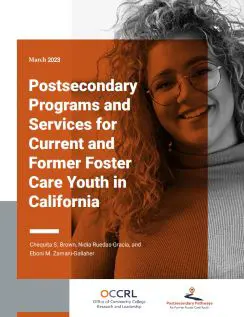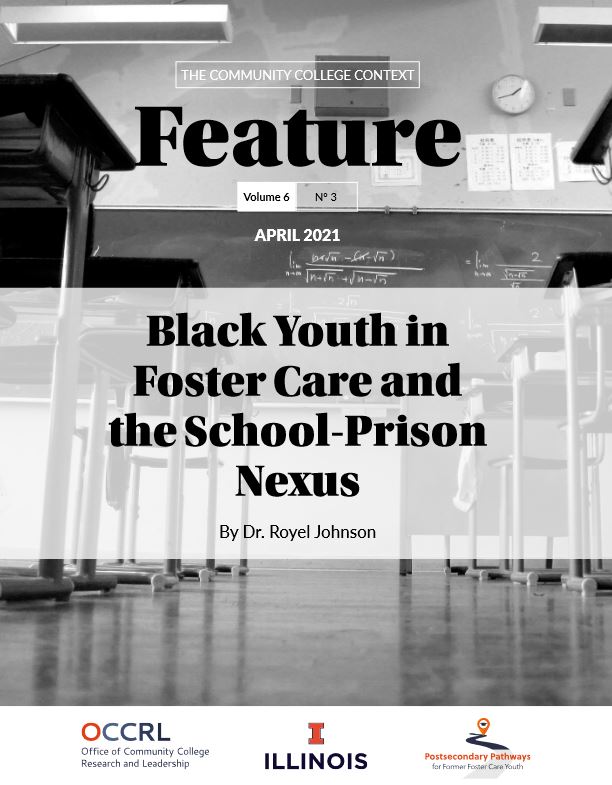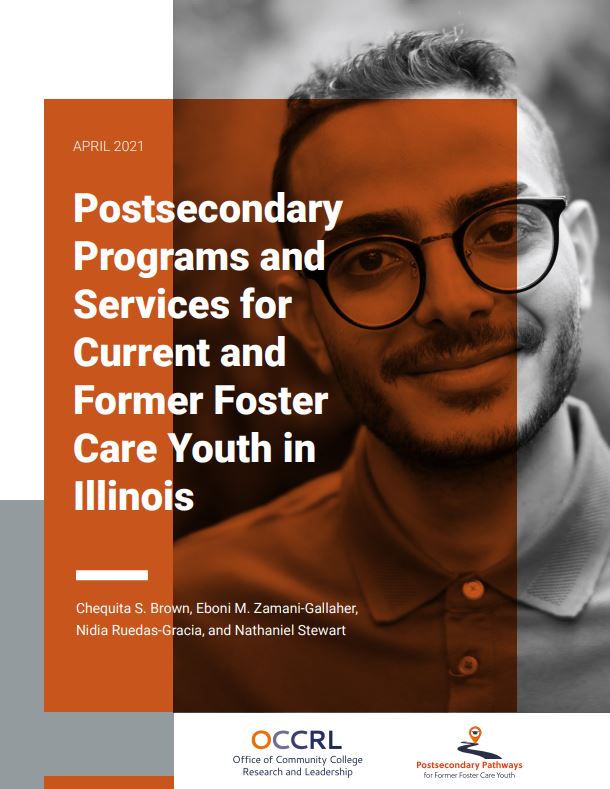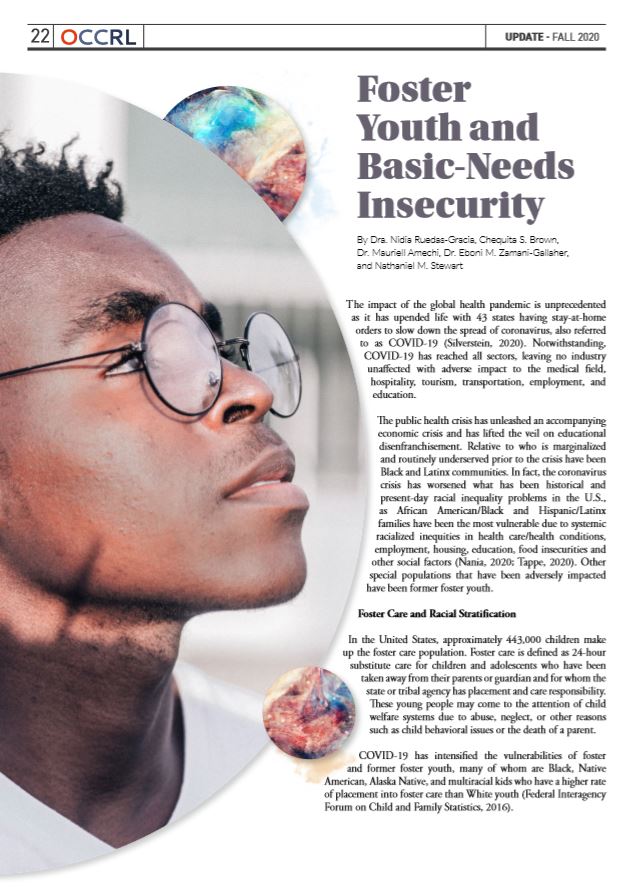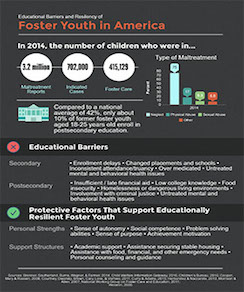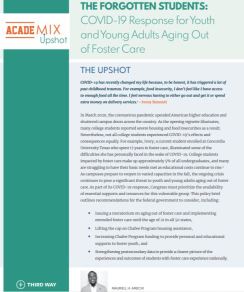
Postsecondary Pathways - for Former Foster Care Youth
This project has been completed and is no longer active.
However, we hope you are able to utilize its resources.
The Postsecondary Pathways for Former Foster Care Youth (PP-FFCY) reflects OCCRL’s commitment to examining and developing postsecondary pathways that support mobility for first-generation, underserved, and minoritized populations, as well as strengthening career pathways to promote seamless transitions from college to careers. This project endeavors to examine postsecondary access, opportunities, and supports for foster youth in Illinois and other states across the county in addressing access and outcomes of FFCY in Career Technical Education (CTE).
Purpose
The Postsecondary Education Pathways for Former Foster Care Youth (PP-FFCY) project is an exploratory study focused on postsecondary pathways for current and former foster youth in Illinois. OCCRL is conducting a comprehensive-needs assessment that provides a descriptive profile of current and former foster youth populations in Illinois; examines postsecondary access, opportunities, and supports for foster youth in Illinois; and addresses disparities in career and technical education (CTE) programs. This project reflects OCCRL’s commitment to examining and developing postsecondary pathways that support mobility for first-generation, underserved, and minoritized populations as well as strengthening and supporting career pathways to promote seamless transitions from college to careers.
Resources
OCCRL aims to increase postsecondary awareness, access, and attainment for current and former foster care youth by providing information on programs and other resources that offer holistic support and services. View the list of postsecondary programs and services.
Strategies to Cultivate a Foster-Friendly Culture on Community College Campuses
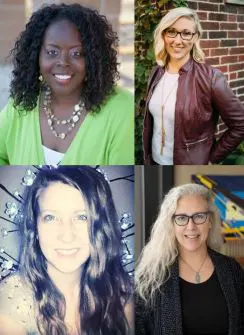 In this episode, Chequita Brown talks with Kate Danielson of the organization Foster Progress, as well as with Anna Wandtke and Tricia Wagner of Rock Valley College in Rockford, Illinois. The group discusses how to cultivate a foster-friendly culture at Illinois community colleges.
In this episode, Chequita Brown talks with Kate Danielson of the organization Foster Progress, as well as with Anna Wandtke and Tricia Wagner of Rock Valley College in Rockford, Illinois. The group discusses how to cultivate a foster-friendly culture at Illinois community colleges.
Navigating College as a Foster Care Alum
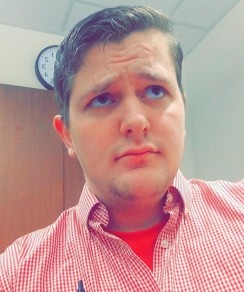 In this episode, OCCRL research assistant Chequita S. Brown talks with Jonathan Stacy, a sophomore at Heartland Community College who is pursuing his studies and a possible career in criminal justice.
In this episode, OCCRL research assistant Chequita S. Brown talks with Jonathan Stacy, a sophomore at Heartland Community College who is pursuing his studies and a possible career in criminal justice.
Listen to the podcast and view the transcript.
Key Elements to Successfully Connecting Foster Care Youth to Educational Resources for Postsecondary Success
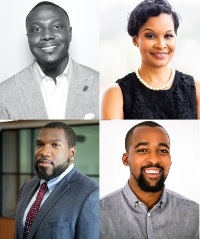 In this episode, Nathaniel Stewart talks with Mauriell Amechi, Regina Gavin Williams, and Blayne Stone Jr. about how the transitions and pathways to postsecondary education are similar and different for Black former foster care students. The scholars also discuss key elements to successfully connect foster care youth to educational resources that help advance the postsecondary education opportunities for this student population.
In this episode, Nathaniel Stewart talks with Mauriell Amechi, Regina Gavin Williams, and Blayne Stone Jr. about how the transitions and pathways to postsecondary education are similar and different for Black former foster care students. The scholars also discuss key elements to successfully connect foster care youth to educational resources that help advance the postsecondary education opportunities for this student population.
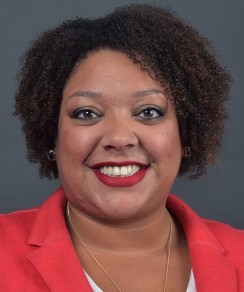
Maddy Day
The Impact of Campus-Based Support Programming on Foster Care Collegians' Postsecondary Access and Retention
In this episode, Chequita Brown of OCCRL talks with Maddy Day about the Fostering Success initiative in Michigan and the impact of campus-based support programming on foster carecollegians' postsecondary access and retention.
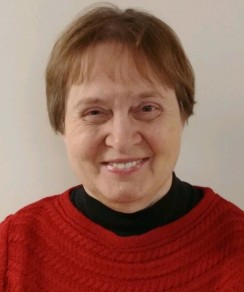
Patricia Palmer
How Youth-in-Care in Illinois Can Access Educational Resources to Pursue a Postsecondary Education
In this episode, OCCRL research assistant Chequita Brown continues the conversation on foster care youth by talking about with Patricia Palmer about accessing available resources in Illinois for youth-in-care who want to pursue a postsecondary education.

Nidia Ruedas-Gracia
Conceptualizing 'Sense of Belonging' Among Students From Historically Minoritized Racial Groups Within Higher Education
In this episode, Colvin Georges Jr., a research associate at OCCRL, talks with Dr. Nidia Ruedas-Gracia about what it means to have a sense of belonging and discusses her research in this area. They also discuss how a sense of belonging affects college students from historically minoritized racial groups.
Postsecondary Programs and Services for Current and Former Foster Care Youth in California
By Chequita S. Brown, Nidia Ruedas-Gracia, and Eboni M. Zamani-Gallaher
This brief highlights postsecondary programs and services in California that support youth in care, in addition to young adults who are aging out of foster care. Read more.
Tracking College-to-Career Pathways for Foster Youth
By Chequita S. Brown
In this OCCRL Thought Paper, Chequita S. Brown relates how tracking the data of students with foster care experience helps to recognize them as a legitimate student population. She offers recommendations on how to do this and conveys the many obstacles that can hinder the academic and career success of foster youth. Read more.
Black Youth in Foster and the School-Prison Nexus
By Royel Johnson
In this OCCRL Feature Brief, Dr. Royel Johnson argues that the foster care system, and more specifically congregate care facilities, are part and parcel to the enhancement of carceral state power. Read more.
Postsecondary Programs and Services for Current and Former Foster Care Youth in Illinois
By Chequita S. Brown, Eboni Zamani-Gallaher, Nidia Ruedas-Gracia, and Nathaniel M. Stewart
This research brief provides an overview of programs and services that helps strengthen postsecondary pathways for current and former foster youth in Illinois. Read more.
Foster Youth and Basic-Needs Insecurity
By Dra. Nidia Ruedas-Gracia, Chequita S. Brown, Dr. Mauriell Amechi, Dr. Eboni Zamani-Gallaher, and Nathaniel M. Stewart
This article discusses how COVID-19 has intensified the vulnerabilities of foster youth and former foster youth, many of whom are Black, Native American, Alaska Native, and multiracial children who have a higher rate of placement into foster care than White youth (Federal Interagency Forum on Child and Family Statistics, 2016). Read more.
(From the Fall 2020 UPDATE on Research and Leadership)
Exploring Equity in Postsecondary Education
By Heather L. Fox, Eboni M. Zamani-Gallaher
This chapter examines how postsecondary practitioners are encouraged to work collaboratively with child welfare agencies and other community-based organizations to identify and implement culturally responsive supports for former foster youth to promote early academic achievement. Read more.
The Forgotten Students: COVID-19 Response for Youth and Young Adults Aging Out of Foster Care
By Mauriell H. Amechi
This policy brief outlines recommendations for Congress to consider regarding the country's COVID-19 response, in an effort to prioritize the availability of essential supports and resources for youth and young adults who are aging out of foster care. Read more.
Chicago Organization Assists Youth Through 'Find Your Future' Program
Genuine opportunities for professional development can be difficult to find for young adults. Applying to different jobs, internships, and programs that promise to help you gain skills and experience for the workplace can become stressful. Then there is the task of weighing your options and hoping you select the right program. The most bitter fact of all is that if you fall into foster youth, at-risk (also known as "opportunity youth"), or low-income populations, these opportunities can seem virtually impossible.
The nonprofit Chicago organization Kaleidoscope addresses these struggles through its Find Your Future program.
The mission of Kaleidoscope 4 Kids is to empower children, youth, and families impacted by abuse and neglect by building resourcefulness, resiliency, and supportive relationships through innovative, individualized case-management and clinical services. The Find Your Future Program provides current and former foster youth who are attending college with a paid 10-week summer internship that offers vocational training.
Sadly, Find Your Future has seen a dramatic decline in numbers over the years, according to Patricia Fiorito, the program manager from 2011 to 2019. Here’s what she said in a phone interview:
“There are many good caseworkers, but unfortunately they are extremely busy and they have really high caseloads, which prevents them from knowing all of the resources that are available to their youth; so that’s one component. The young people, it’s fifty-fifty if you will, from a very young start the longer that they were in the system or within foster care, and then transitioning to the other programs as they aged, lost confidence within themselves and sometimes were not encouraged that they could be better, that they will be successful, so I think that is a component. Then there’s, you know, not knowing what the program is and Kaleidoscope not having enough manpower to support a tactful, blitz, guerilla-marketing strategy to make it more known. This year has the lowest, the lowest, in nine-years of a turnout of applications. To the point where the deadline for the program is typically the second or third week of December, right after winter exams, and they had to extend it until January because they didn’t have even enough applications to run a program.”
Unfortunately, programs like Find Your Future don’t seem to reach the populations that need the services the most. When it comes to communication, information dissemination is described as the spreading of information and knowledge for public consumption. This then provides individuals with a choice to act on said knowledge in a way that best suits them and their families. For Fiorito, Find Your Future meant everything:
“What that program meant to me, it’s hard to answer that question because I didn’t know what it was going to mean to me, when I first started it … it meant the world to me; it meant the world because I knew that (this) program was providing young people an opportunity, financial resources, resources to employers and business references and professional references”
What good is having resources if we don’t properly inform and educate those who need them? Foster youth, individuals from low-income communities, and people of color are at enough risk in this country each day without the added burden of denying them the knowledge they need to improve their situation. We must find a better way to communicate the resources we have for others so that their varied tasks and goals can be realized. In short, we must strive for the influence that Find Your Future has had on so many children. Here are final thoughts from Fiorito on her experience at Find Your Future:
“I know the impact; it’s so fun! I had a student last week who messaged me, asking me for a tax document from 2017 because she was just getting ready to buy a house. She’s a single mother, now going to grad school, and now getting ready to buy her first house and although I know she’s a very strong individual, she might not have had the confidence to do all of those steps, much less at the same time, if Find Your Future didn’t exist and other programs like You’re your Future. I see the graduations on Facebook. I’m still connected with many students from the program that are now becoming young adults, and seeing them graduate with their master’s degree, and getting married and having successful lives; that’s how it’s impacting me because just to know that I got to walk along with student while they were starting to build their lives—it makes me feel good about the work!”
The above photo, courtesy of Kaleidoscope, shows the end results of a team-building activity in which Kaleidoscope youth constructed a toy for children out of random office supplies and then marketed it to "parents."
